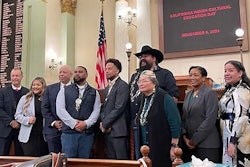PROVIDENCE R.I.
Rhode Island
authorities lost a lawsuit Friday disputing the federal government’s ability to
take land into trust for American Indian tribes, a case Indian rights groups
fear could undermine tribal land across the country.
In a 4-2 decision, the 1st U.S. Circuit Court of Appeals in
Boston rejected the state’s view that the 1934 Indian Reorganization Act
prevents the federal government from taking land into trust for tribes
recognized after the law took effect, unless Congress specifically authorized
it.
“This case affirms the tribe’s federal rights and
federal recognition, which have been a matter of debate between the tribe and
state for far too long,” said Jack Killoy, an attorney for the
Narragansett Indian Tribe.
Attorney General Patrick Lynch plans an appeal to the U.S.
Supreme Court, said his spokesman, Michael Healey.
At question is whether a 31-acre lot in Charlestown
purchased by the Narragansetts should be subject to Rhode Island law, including
a prohibition on casino gambling, or whether the parcel should be governed by
tribal and federal law.
The dispute began in 1991 when the Narragansetts purchased
the land to build an elderly housing complex, which remains incomplete. Acting
on the tribe’s request, the U.S. Department of the Interior moved to take the
land into federal trust, which would place it largely under tribal and federal
control.
Gov. Don Carcieri’s administration objected, arguing the
federal government lacked the authority to create an autonomous tribal enclave
in this small state. His lawyers claimed the federal government couldn’t set up
a trust because the Narragansetts weren’t recognized until 49 years after the
1934 law took effect.
Judge Sandra Lynch said the state’s interpretation was too
narrow because the 1934 law attempted to remedy past wrongs and strengthen
tribes.
“Based on this view, it would make no sense to
distinguish among tribes based on the happenstance of their federal recognition
in 1934,” she wrote in the majority opinion.
It’s unclear how much tribal land could be cast into legal
uncertainty if the state prevails. The Bureau of Indian Affairs has never
provided either side a complete list of its holdings.
The Narragansetts’ victory may rekindle a debate over casino
gambling in Rhode Island.
Under a 1978 agreement with the state, the Narragansetts
received 1,800 acres of land on the condition it would be subject to state law,
including a casino ban. The document never spelled out whether land
subsequently acquired by the tribe would be subject to the same restrictions.
A federal law sponsored by the late Sen. John Chafee
prevented the Narragansetts from building a casino on the original settlement
lands under the 1988 Indian Gaming Regulatory Act. State lawyers aren’t sure
whether the prohibition applies if new tribe lands are placed into federal trust.
– Associated Press
© Copyright 2005 by DiverseEducation.com


















